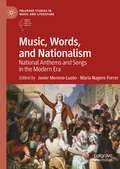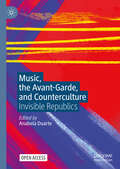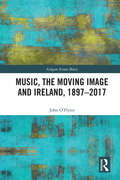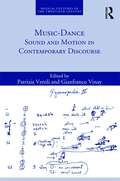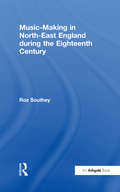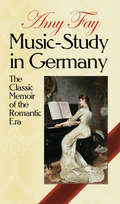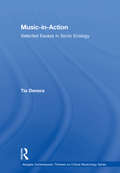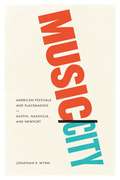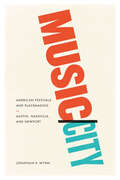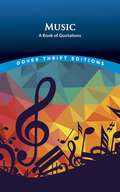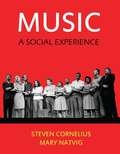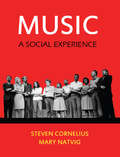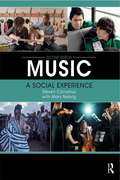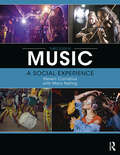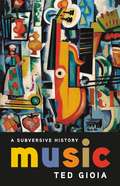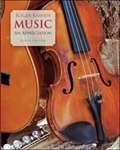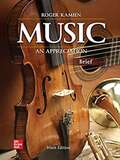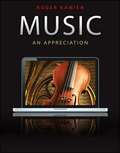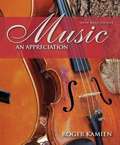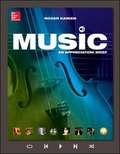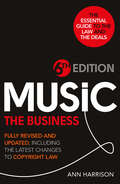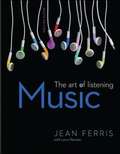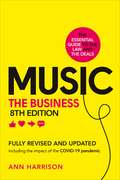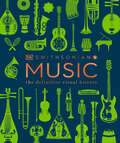- Table View
- List View
Music, Words, and Nationalism: National Anthems and Songs in the Modern Era (Palgrave Studies in Music and Literature)
by Javier Moreno-Luzón María Nagore-FerrerMusic, Words and Nationalism: National Anthems and Songs in the Modern Era considers the concept of nationalism from 1780 to 2020 through anthems and national songs as symbolic and representative elements of the national identity of individuals, peoples, or collectivities. The volume shows that both the words and music of these works reveal a great deal about the defining features of a nation, its political and cultural history, and its self-perception. The book takes an interdisciplinary approach that provides a better understanding of the role of national anthems and songs in the expression of national identities and nationalistic goals. From this perspective, the relationship between hymns and political contexts, their own symbolic content (both literary and musical) and the role of specific hymns in the construction of national sentiments are surveyed.
Music, the Avant-Garde, and Counterculture: Invisible Republics
by Anabela DuarteThis book studies how the complex relationship between music, the avant-garde, and counterculture challenges all sorts of boundaries. By exploring the avant-garde as a thoughtful inquiry into experimentation, creativity, and originality, we bring to the fore the "invisible republics" of culture, the ephemeral, the suppressed, and the unconformity of artistic and political undercurrents. Avant-garde and experimental art are international in scope, and their trajectory, as we see it, has been to expand themselves towards a new enlightenment, a critical project, and a rhizomatic entity, albeit with tacit harmony and cohesion. From Bucharest to Paris, London to New York, Paris to Brazil, Cuba, or Chile, to name a few, the same urge for the unknown and anti-art poetics emerged almost simultaneously in every field. We ask how these separate geographical territories (and practices) speak to each other and how this might reshape scholars' historical understanding of European and American modernity. This is an open access book.
Music, the Moving Image and Ireland, 1897–2017 (Ashgate Screen Music Series)
by John O'FlynnMusic, the Moving Image and Ireland, 1897–2017 constitutes the first comprehensive study of music for screen productions from or relating to the island. It identifies and interprets tendencies over the first 120 years of a field comprising the relatively distinct yet often overlapping areas of Irish-themed and Irish-produced film. Dividing into three parts, the book first explores accompaniments and scores for 20th-century Irish-themed narrative features that resulted in significant contributions by many Hollywood, British, continental European and, to a lesser extent, Irish composers, along with the input of many orchestras and other musicians. Its second part is framed by a consideration of various cultural, political and economic developments in both the Republic of Ireland and Northern Ireland from the 1920s (including the Troubles of 1968–1998). Focusing on scoring and other aspects of soundtrack production for domestic newsreel, documentary film and TV programming, it interprets the substantial output of many Irish composers within this milieu, particularly from the 1960s to the 1990s. Also referring to broader cultural and historical themes, the book’s third and final part charts approaches to and developments in music and sound design over various waves of Irish cinema, from its relatively late emergence in the 1970s to an exponential growth and increasingly transnational orientation in the early decades of the 21st century.
Music-Dance: Sound and Motion in Contemporary Discourse (Musical Cultures of the Twentieth Century)
by Patrizia Veroli Gianfranco VinayMusic-Dance explores the identity of choreomusical work, its complex authorship and its modes of reception as well as the cognitive processes involved in the reception of dance performance. Scholars of dance and music analyse the ways in which a musical score changes its prescriptive status when it becomes part of a choreographic project, the encounter between sound and motion on stage, and the intersection of listening and seeing. As well as being of interest to musicologists and choreologists considering issues such as notation, multimedia and the analysis of performance, this volume will appeal to scholars interested in applied research in the fields of cognition and neuroscience. The line-up of authors comprises representative figures of today’s choreomusicology, dance historians, scholars of twentieth-century composition and specialists in cognitive science and performance studies. Among the topics covered are multimedia and the analysis of performance; the notational practice of choreographers and the parallel attempts of composers to find a graphic representation for musical gestures; and the experience of dance as a paradigm for a multimodal perception, which is investigated in terms of how the association of sound and movement triggers emotions and specific forms of cognition.
Music-Making in North-East England during the Eighteenth Century
by Roz SoutheyThe north-east of England in the eighteenth century was a region where many different kinds of musical activity thrived and where a wide range of documentation survives. Such activities included concert-giving, teaching, tuning and composition, as well as music in the theatre and in church. Dr Roz Southey examines the impulses behind such activities and the meanings that local people found inherent in them. It is evident that music could be perceived or utilized for extremely diverse purposes; as entertainment, as a learned art, as an aid to piety, as a profession, a social facilitator and a support to patriotism and nationalism. Musical societies were established throughout the century, and Southey illustrates the social make-up of the members, as well as the role of Gentlemen Amateurs in the organizing of concerts, and the connections with London and other centres. The book draws upon a rich selection of source material, including local newspapers, council and ecclesiastical records, private papers and diaries and accounts of local tradesman, as well as surviving examples of music composed in the area by Charles Avison, Thomas Ebdon and John Garth of Durham, amongst many others. Charles Avison's importance is focused upon particularly, and his Essay on Musical Expression is considered alongside other contemporary writings of lesser fame. Southey provides a fascinating insight into the type and social class of audiences and their influence on the repertoire performed. The book moves from a consideration of music being used as a 'fashion item', evidenced by the patronage of 'big name' soloists from London and abroad, to fiddlers, ballad singers, music at weddings, funerals, public celebrations, and music for marking the events of the American War of Independence and the French Revolutionary Wars. It can be seen, therefore, that the north east was an area of important musical activity, and that the music was always interwoven into the political, economic, religious and commercial fabric of eighteenth-century life.
Music-Study in Germany: The Classic Memoir of the Romantic Era (Dover Books On Music: History)
by Amy Fay Frances DillonIn this series of letters written between November 1869 and May 1875, a young American pianist, Amy Fay, recounts the thrilling experience of studying piano with such great teachers as Liszt, Tausig, and Kullak. Printed 21 times in America, published also in London, and translated into French and German, this book has clearly established its wide appeal to music students.The author describes the customs and mores, the place of interest, and the people she encountered during her stay in Germany, then the music capital of the world. In a vivid style and with youthful exuberance, she imparts to the reader her impressions of performances by Anton Rubinstein, Clara Schumann, Tausig, Liszt, the great violinist Joachim, Wagner (as conductor), and other notables of music history. Her account of a reception and concert in honor of Wagner is especially fascinating.But the sections of this entirely engaging work that are of primary importance to music students, particularly to students and teachers of the piano, are the author's detailed accounts of the teaching methods of the great piano virtuosi. Interesting pictures of lessons of Tausig's conservatory, of Kullak's teaching techniques, and, above all, a unique portrait of Liszt the man, the teacher, and the performer emerge from these letters. So valued are Amy Fay's impressions of Liszt, in fact, that these sections alone are regarded as a miniature classic. For this Dover edition, Professor Frances Dillon of the Mannes College of Music contributed an informative introduction.Because of her position as a student working closely with Liszt, Tausig, Kullak, and Deppe, Amy Fay was able to reveal many little-known facets of their work and their teaching techniques. Her obvious enthusiasm and serious attitude towards her study make this a work of great liveliness and rare insight. Not only students of the piano, but all musicologists will find her comments and descriptions invaluable. And the general reader should enjoy the many anecdotes and personal glimpses of these famous names in music.
Music-in-Action: Selected Essays in Sonic Ecology (Ashgate Contemporary Thinkers On Critical Musicology Ser.)
by Tia DeNoraThis volume brings together DeNora‘s work published between 1986 and 2007. It includes thirteen essays, some of which have had a major impact on the field. The chapters trace the development of her work from its early concern with musical meaning, historical ethnography and theeveryday perspective, to its current focus on music in action. Topics covered include Adorno on Schoenberg and Stravinsky, a theory of music as a space and place for interpretive work, research methods for historical musicology, and the first key statement of her theory of music as an active ingredient in social life. These building blocks are then employed to investigate music and embodied experience, sexuality and gender differentiation, and music‘s role as a technology of health. The essays are set in a multi-disciplinary context with an autobiographical introduction.
Music/City
by Jonathan R. WynnAustin's famed South by Southwest is far more than a festival celebrating indie music. It's also a big networking party that sparks the imagination of hip, creative types and galvanizes countless pilgrimages to the city. Festivals like SXSW are a lot of fun, but for city halls, media corporations, cultural institutions, and community groups, they're also a vital part of a complex growth strategy. In Music/City, Jonathan R. Wynn immerses us in the world of festivals, giving readers a unique perspective on contemporary urban and cultural life. Wynn tracks the history of festivals in Newport, Nashville, and Austin, taking readers on-site to consider different festival agendas and styles of organization. It's all here: from the musician looking to build her career to the mayor who wants to exploit a local cultural scene, from a resident's frustration over corporate branding of his city to the music executive hoping to sell records. Music/City offers a sharp perspective on cities and cultural institutions in action and analyzes how governments mobilize massive organizational resources to become promotional machines. Wynn's analysis culminates with an impassioned argument for temporary events, claiming that when done right, temporary occasions like festivals can serve as responsive, flexible, and adaptable products attuned to local places and communities.
Music/City: American Festivals and Placemaking in Austin, Nashville, and Newport
by Jonathan R. WynnAustin’s famed South by Southwest is far more than a festival celebrating indie music. It’s also a big networking party that sparks the imagination of hip, creative types and galvanizes countless pilgrimages to the city. Festivals like SXSW are a lot of fun, but for city halls, media corporations, cultural institutions, and community groups, they’re also a vital part of a complex growth strategy. In Music/City, Jonathan R. Wynn immerses us in the world of festivals, giving readers a unique perspective on contemporary urban and cultural life. Wynn tracks the history of festivals in Newport, Nashville, and Austin, taking readers on-site to consider different festival agendas and styles of organization. It’s all here: from the musician looking to build her career to the mayor who wants to exploit a local cultural scene, from a resident’s frustration over corporate branding of his city to the music executive hoping to sell records. Music/City offers a sharp perspective on cities and cultural institutions in action and analyzes how governments mobilize massive organizational resources to become promotional machines. Wynn’s analysis culminates with an impassioned argument for temporary events, claiming that when done right, temporary occasions like festivals can serve as responsive, flexible, and adaptable products attuned to local places and communities.
Music: A Book of Quotations (Dover Thrift Editions: Speeches/quotations Ser.)
by Herb GalewitzMore than 400 memorable quotes are arranged alphabetically by author, from Fred Allen ("When Jack Benny plays the violin, it sounds as if the strings are still back in the cat.") to Friedrich Nietzsche ("Is Wagner a human being at all? Is he not rather a disease?"), many more.
Music: A Mathematical Offering
by Dave BensonSince the time of the Ancient Greeks, much has been written about the relation between mathematics and music: from harmony and number theory, to musical patterns and group theory. Benson provides a wealth of information here to enable the teacher, the student, or the interested amateur to understand at varying levels of technicality, the real interplay between these two ancient disciplines. The story is long as well as broad and involves physics, biology, psycho acoustics, the history of science, and digital technology as well as, of course, mathematics and music. Starting with the structure of the human ear and its relationship with Fourier analysis the story proceeds via the mathematics of musical instruments to the ideas of consonance and dissonance, and then to scales and temperaments. This is a must-have book if you want to know about the music of the spheres or digital music and many things in between.
Music: A Social Experience
by Steven Cornelius Mary NatvigMusic: A Social Experience offers a topical approach for a music appreciation course. Through a series of subjects#65533;from Music and Worship to Music and War and Music and Gender#65533;the authors present active listening experiences for students to experience music's social and cultural impact. The book offers an introduction to the standard concert repertoire, but also gives equal treatment to world music, rock and popular music, and jazz, to give students a thorough introduction to today's rich musical world. Through lively narratives and innovative activities, the student is given the tools to form a personal appreciation and understanding of the power of music. The book is paired with MySearchLab, featuring listening guides with streaming audio, short texts on special topics, and sample recordings and notation to illustrate basic concepts in music.
Music: A Social Experience
by Steven Cornelius Mary NatvigMusic: A Social Experience offers a topical approach for a music appreciation course. Through a series of subjects–from Music and Worship to Music and War and Music and Gender–the authors present active listening experiences for students to experience music's social and cultural impact. The book offers an introduction to the standard concert repertoire, but also gives equal treatment to world music, rock and popular music, and jazz, to give students a thorough introduction to today's rich musical world. Through lively narratives and innovative activities, the student is given the tools to form a personal appreciation and understanding of the power of music. The book is paired with MySearchLab, featuring listening guides with streaming audio, short texts on special topics, and sample recordings and notation to illustrate basic concepts in music.
Music: A Social Experience
by Steven Cornelius Mary NatvigBy taking a thematic approach to the study of music appreciation, Music: A Social Experience, Second Edition demonstrates how music reflects and deepens both individual and cultural understandings. Musical examples are presented within universally experienced social frameworks (ethnicity, gender, spirituality, love, and more) to help students understand how music reflects and advances human experience. Students engage with multiple genres (Western art music, popular music, and world music) through lively narratives and innovative activities. A companion website features streaming audio and instructors' resources. New to this edition: Two additional chapters: "Music and the Life Cycle" and "Music and Technology" Essay questions and "key terms" lists at the ends of chapters Additional repertoire and listening guides covering all historical periods of Western art music Expanded instructors’ resources Many additional images Updated student web materials
Music: A Social Experience
by Steven Cornelius Mary NatvigBy taking a thematic approach to the study of music appreciation, Music: A Social Experience, Third Edition demonstrates how music reflects and deepens both individual and cultural understandings. Musical examples are presented within universally experienced social frameworks (ethnicity, gender, spirituality, love, and more) to help students understand how music reflects and advances human experience. Students engage with multiple genres (Western art music, popular music, and world music) through lively narratives and innovative activities. A companion website features streaming audio and instructors' resources. The third edition includes: A chapter on Black American music A revised and developed chapter on gender and sexuality A dozen additional Listening Guides, with an emphasis on contemporary popular music Over 100 new full-color images Updated teacher and student resources on the book’s companion website Expanded content throughout, highlighting the social, cultural, and technological changes since publication of the previous edition The culmination of thirty years of experimentation in the music appreciation classroom, this third edition of Music: A Social Experience continues to empower lifelong musical learning by engaging students and readers on their own terms.
Music: A Subversive History
by Ted GioiaA preeminent music historian and critic presents a global history of music from the bottom upHistories of music overwhelmingly suppress stories of the outsiders and rebels who created musical revolutions and instead celebrate the mainstream assimilators who borrowed innovations, diluted their impact, and disguised their sources. In Music: A Subversive History, historian Ted Gioia reclaims the story of music for the riffraff, insurgents, and provocateurs.Gioia tells a four-thousand-year history of music as a global source of power, change, and upheaval. He shows how social outcasts have repeatedly become trailblazers of musical expression: slaves and their descendants, for instance, have repeatedly reinvented music, from ancient times all the way to the jazz, reggae, and hip-hop sounds of the current day. Music: A Subversive History is essential reading for anyone interested in the meaning of music, from Sappho to the Sex Pistols to Spotify.
Music: An Appreciation
by Roger Kamien"This text provides an approach to perceptive listening and an introduction to musical elements, forms, and stylistic periods. Its discussions of composers' lives, individual styles, and representative works aim not merely to impart facts but to stimulate curiosity and enthusiasm. The book was written to heighten the readers' love of music as well as to develop their listening skills." - from the Preface to the Seventh Edition Through six editions, Roger Kamien's Music: An Appreciation has become the most widely used text for Music Appreciation and Introduction to Music Literature courses. The author has approached his new seventh edition with the goal of re-examining the scholarship and refreshing the repertoire while maintaining the strengths that have made the book number one - the clear presentation of musical elements, the vivid depiction of music history, the carefully chosen musical examples, the detailed and informative Listening Outlines, and the unsurpassed supplements
Music: An Appreciation
by Roger KamienMusic: An Appreciation welcomes non-majors to the art of listening to great music. Roger Kamien continues to focus on coverage of the elements of music, fostering each student's unique path to listening and understanding. The Brief 10th edition of Music: An Appreciation equips students with the language, tools, and listening skills required to sustain a lifelong enthusiasm for music. <p><p> Typically the first material that a Music Appreciation student encounters in the semester is about the elements of music. Often it is a student's first exposure to musical vocabulary and concepts. The new edition features four learning tools that supplement and expand on Roger Kamien's narrative on the elements. These include Elements of Music Interactives, Fundamentals of Music Video Tutorials, Spotify Playlists, and targeted guidance in Listening Outlines and Vocal Listening Guides.
Music: An Appreciation (10th edition)
by Roger KamienWhat does it take to make a great performance? It takes great music, a great performer and a great instrument. Music: An appreciation examines some of the greatest music ever created. Roger Kamien's excellence as an interpreter of that music has made his program number one in the market used by over half a million students since its conception. Now, connect Kamien provides the world-class instrument that allows Music: An Appreciation to bring great music to his audience in an extraordinary new way. Music: An Appreciation is the right music, the right interpreter, and the right instrument.
Music: An Appreciation (6th Brief Edition)
by Roger KamienWhether from a concert stage or at the front of a classroom, Roger Kamien knows how to reach an audience--blending intelligence and passion to lift music from the page and bring it to life. His unique combination of artistic and teaching skills makes Music: An Appreciation, Brief Edition an invaluable tool for students wanting to learn more about music. This best-selling textbook introduces students to perceptive listening and provides an engaging introduction to musical elements, forms, and stylistic periods. It is organized chronologically, but individual sections can be addressed in any order, for a variety of teaching approaches. Musical notation is included but is not required to understand the popular listening guides featured in the text, which focus students' attention on musical events as they unfold. The Online Learning Center for this text provides open access for all students to many activities and video instrument demonstrations in addition to quiz and study materials for each chapter.
Music: An Appreciation (Brief 8th Edition)
by Roger KamienMcGraw-Hill is revolutionizing the Music Appreciation course by introducing its first personalized digital learning experience with Roger Kamien's Music: An Appreciation, Brief Edition. Using this market-leading instrument that brings great music to the course in more ways than ever before, students are now transformed into active participants in the Music Appreciation space. The result is active listening, active reading, and active learning. Connect is the only integrated learning system that empowers students by continuously adapting to deliver precisely what they need, when they need it, so that your class time is more engaging and effective. It provides tools that make assessment easier, learning more engaging, and studying more efficient.
Music: Fully revised and updated, including the latest changes to Copyright law
by Ann HarrisonThis essential and highly acclaimed guide, now updated and revised in its sixth edition, explains the business of the British music industry. Drawing on her extensive experience as a media lawyer, Ann Harrison offers a unique, expert opinion on the deals, the contracts and the business as a whole. She examines in detail the changing face of the music industry and provides absorbing and up-to-date case studies. Whether you’re a recording artist, songwriter, music business manager, industry executive, publisher, journalist, media student, accountant or lawyer, this practical and comprehensive guide is indispensable reading. Fully revised and updated. Includes: The current types of record and publishing deals, and what you can expect to see in the contracts A guide to making a record, manufacture, distribution, branding, marketing, merchandising, sponsorship, band arrangements and touring The most up-to-date information on copyright law and related rights An in-depth look at digital downloads, streaming, online marketing and piracy Case studies illustrating key developments and legal jargon explained.
Music: The Art Of Listening
by Jean Ferris Larry WorsterWith Music: The Art of Listening, students practice engaging with music critically, and with an appreciative ear. Presenting music within a broadened cultural and historical context, The Art of Listeningencourages students to draw on the relationships between: music and the other arts; musical characteristics of different periods; as well as Western music and various non-Western musics and concepts. Learning to appreciate music is a skill. Together with McGraw-Hill's Connect Music, The Art of Listening helps students develop that skill by encouraging them to be active and thoughtful participants in their own listening experience. Whether listening through headphones or at a live performance, The Art of Listening will develop students' ability to hone the skills required to listen to, reflect upon, and write about music.
Music: The Business (8th edition)
by Ann HarrisonThis essential and highly acclaimed guide, now updated and revised in its eighth edition, explains the business of the British music industry.Drawing on her extensive experience as a media lawyer, Ann Harrison offers a unique, expert opinion on the deals, the contracts and the business as a whole. She examines in detail the changing face of the music industry and provides absorbing and up-to-date case studies.Whether you're a recording artist, songwriter, music business manager, industry executive, publisher, journalist, media student, accountant or lawyer, this practical and comprehensive guide is indispensable reading.Fully revised and updated. Includes:· The current types of record and publishing deals, and what you can expect to see in the contracts· A guide to making a record, manufacture, distribution, branding, marketing, merchandising, sponsorship, band arrangements and touring· Information on music streaming, digital downloads and piracy· The most up-to-date insights on how the COVID-19 crisis has affected marketing· An in-depth look at copyright law and related rights· Case studies illustrating key developments and legal jargon explained.
Music: The Definitive Visual History (DK Definitive Visual Encyclopedias)
by DKProduced in association with the Smithsonian and including images from The National Music Museum in South Dakota, Music: The Definitive Visual History guides readers through the progression of music since its prehistoric beginnings, discussing not just Western classical music, but music from all around the world.Telling the story of musical developments, era by era, linking musical theory, technology, and human genius into the narrative, Music: The Definitive Visual History profiles the lives of groundbreaking musicians from Mozart to Elvis, takes an in-depth look at the history and function of various instruments, and includes listening suggestions for each music style.Anyone with an interest in music will enjoy learning about the epic journey the art has taken over the years and will learn to appreciate music with a new ear.
